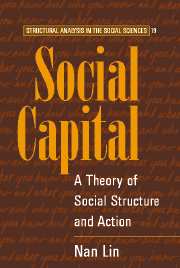Crossref Citations
This Book has been
cited by the following publications. This list is generated based on data provided by Crossref.
Salaff, Janet W.
2001.
Book Review: Grounding Grounded Theory: Guidelines for Qualitative Inquiry.
Field Methods,
Vol. 13,
Issue. 4,
p.
414.
WELLMAN, BARRY
HAASE, ANABEL QUAN
WITTE, JAMES
and
HAMPTON, KEITH
2001.
Does the Internet Increase, Decrease, or Supplement Social Capital?.
American Behavioral Scientist,
Vol. 45,
Issue. 3,
p.
436.
Marsden, Peter V.
and
Gorman, Elizabeth H.
2001.
Sourcebook of Labor Markets.
p.
467.
Hemingway, J. L.
2001.
What Comes Around Goes Around: Teaching For and About Social and Human Capital in Leisure Studies.
SCHOLE: A Journal of Leisure Studies and Recreation Education,
Vol. 16,
Issue. 1,
p.
1.
Frank, Kenneth A.
Mueller, Katrina
Krause, Ann
Taylor, William W.
and
Leonard, Nancy J.
2001.
Globalization: Effects on Fisheries Resources.
p.
385.
DiMaggio, Paul
Hargittai, Eszter
Neuman, W. Russell
and
Robinson, John P.
2001.
Social Implications of the Internet.
Annual Review of Sociology,
Vol. 27,
Issue. 1,
p.
307.
Savage, Joanne
and
Kanazawa, Satoshi
2002.
Social Capital, Crime, and Human Nature.
Journal of Contemporary Criminal Justice,
Vol. 18,
Issue. 2,
p.
188.
Quan‐Haase, Anabel
Wellman, Barry
Witte, James C.
and
Hampton, Keith N.
2002.
The Internet in Everyday Life.
p.
289.
Bolino, Mark C.
Turnley, William H.
and
Bloodgood, James M.
2002.
Citizenship Behavior and the Creation of Social Capital in Organizations.
The Academy of Management Review,
Vol. 27,
Issue. 4,
p.
505.
Schaub, Maryellen
and
Baker, David P.
2002.
Schooling and Social Capital in Diverse Cultures.
Vol. 13,
Issue. ,
p.
125.
Parisi, Domenico
Michael Grice, Steven
Taquino, Michael
and
Gill, Duane A.
2002.
Building Capacity for Community Efficacy for Economic Development in Mississippi.
Community Development Society. Journal,
Vol. 33,
Issue. 2,
p.
19.
Gribben, Chris
Wilson, Andrew
Meister, Hans-Peter
Lüth, Arved
and
Gülker, Silke
2002.
Bürgerschaftliches Engagement und Erwerbsarbeit.
p.
159.
Storberg, Julia
2002.
The Evolution of Capital Theory: A Critique of a Theory of Social Capital and Implications for HRD.
Human Resource Development Review,
Vol. 1,
Issue. 4,
p.
468.
McCARTHY, BILL
HAGAN, JOHN
and
MARTIN, MONICA J.
2002.
IN AND OUT OF HARM'S WAY: VIOLENT VICTIMIZATION AND THE SOCIAL CAPITAL OF FICTIVE STREET FAMILIES*.
Criminology,
Vol. 40,
Issue. 4,
p.
831.
Blokland, Talja
2002.
Neighbourhood Social Capital: Does an Urban Gentry Help? Some Stories of Defining Shared Interests, Collective Action and Mutual Support.
Sociological Research Online,
Vol. 7,
Issue. 3,
p.
106.
Schmid, A. Allan
2003.
Discussion: Social Capital as an Important Lever in Economic Development Policy and Private Strategy.
American Journal of Agricultural Economics,
Vol. 85,
Issue. 3,
p.
716.
Batjargal, Bat
2003.
Social Capital and Entrepreneurial Performance in Russia: A Longitudinal Study.
Organization Studies,
Vol. 24,
Issue. 4,
p.
535.
Grant, Miriam
2003.
Difficult Debut: Social and Economic Identities of Urban Youth in Bulawayo, Zimbabwe.
Canadian Journal of African Studies / Revue canadienne des études africaines,
Vol. 37,
Issue. 2-3,
p.
411.
Sáinz, Juan Pablo Pérez
2003.
Globalization, Upgrading, and Small Enterprises: A View from Central America.
Competition & Change,
Vol. 7,
Issue. 4,
p.
205.
Knowlton, Amy R
2003.
Informal HIV caregiving in a vulnerable population: toward a network resource framework.
Social Science & Medicine,
Vol. 56,
Issue. 6,
p.
1307.



